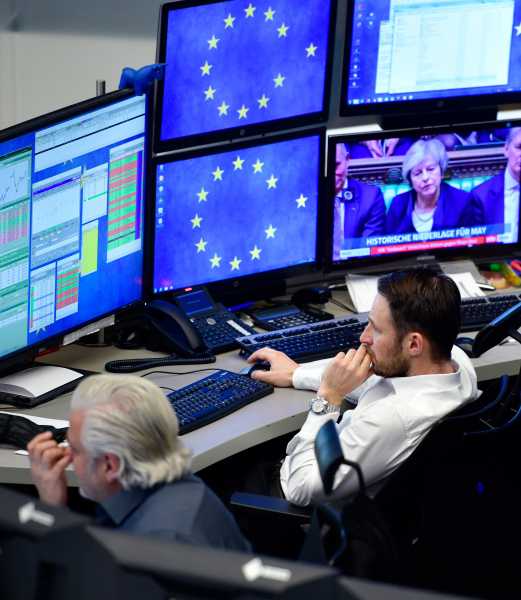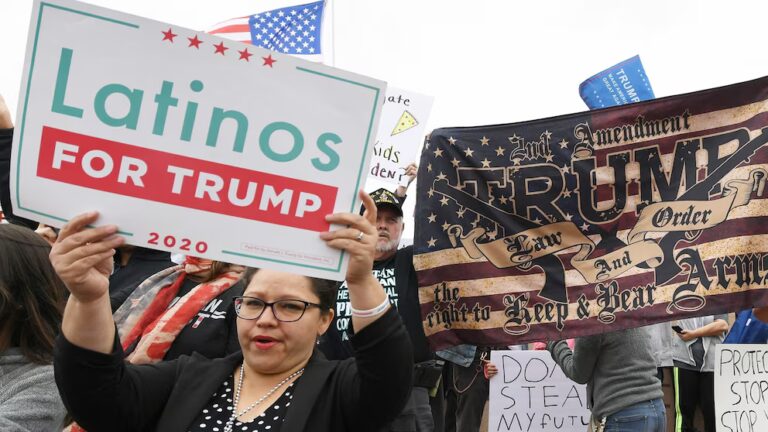
Prime Minister Theresa May returns to Parliament with her so-called “Plan B” for Brexit on Monday, not even a week after her first Brexit deal suffered a historic defeat in Parliament.
Things are not looking great. After surviving a no-confidence vote on Wednesday, May had just a few days to come up with a better solution that hasn’t been discovered in more than two years of trying to find one. Plan B has to appease both the hardline Brexiters and the pro-European factions in her party and in Parliament. (And the European Union while she’s at it.)
Join the Vox Video Lab
Go behind the scenes. Chat with creators. Support Vox video. Become a member of the Vox Video Lab on YouTube today. (Heads up: You might be asked to sign in to Google first.)
And no one — perhaps including May herself — is entirely clear on what that Plan B is going to look like or what’s going to happen next. If no deal is made and agreed upon by all parties before March 29, the UK will experience a “no-deal” Brexit — a potentially catastrophic scenario in which the country simply crashes out of the EU with no rules or safeguards in place.
To try to get a better sense of what the possible scenarios are, I talked to nine experts on British politics. While all cautioned that this is still mostly a guessing game, they gave me their best educated guesses based on their knowledge of May, the views of members of Parliament, and what’s gone down with Brexit so far.
Their answers, edited for length and clarity, are below.
Simon Usherwood, deputy director at the UK in a Changing Europe
May clearly suffered a very heavy defeat on Tuesday with the Brexit deal vote, and she needs to get some people back onside. At the same time, she also seems to have ruled out all of the things that might obviously appeal to some of her opponents.
So I think we have a degree of skepticism about what she’s doing now and whether it really actually is intended to forge a consensus — or whether it’s really about trying to show that Parliament doesn’t have a majority on anything, and thus that Parliament needs to go back to her withdrawal agreement and make that the starting point of whatever they do.
Abraham Newman, director at the Mortara Center for International Studies, Georgetown University
Honestly, it’s going to be chaos. That’s what the future holds. There were these back-and-forths Thursday about whether a no-deal Brexit is on the table for the government. So May says, “Of course it’s on the table,” while Chancellor Philip Hammond says, “No, it’s not on the table,” almost simultaneously.
And it just demonstrates there’s no Plan B, they don’t have a Plan B. They’re going to come up with a rewarmed version of the original withdrawal agreement. That’s the most likely thing.
The problem is that she has not gotten the opposition Labour Party on board. What she really needs is a unity government, something where she has Labour’s buy-in. But she has never tried to do that, and now it’s just too late. And so I fear you’re just going to have chaos.
Chris Wilkins, former director of strategy for Theresa May
I don’t think there’ll be any sort of revelations or fireworks on Monday. I think she will say that she’s held constructive meetings with all of those who’ve been prepared to talk to her over the past few days, and that Plan B is essentially now to go back to Brussels [to talk to EU leaders].
The narrative the government has talked about in the public is that they’ve got this agreement. It’s 500 pages long, it’s detailed, and what we now need to do is be very specific about the bits that MPs want changed, because if they’re specific about it, and if Europe can see that, then we might be prepared to talk about them.
So I think, on Monday, that’s what she will do. It will be quite straightforward: “I’ve been talking to people, getting a sense of what people want changed. I will now go back to Brussels and try and get movement on these things.”
That’s the first stage. However, going forward — and in terms of where I think we are most likely to end up — is a deal in which the UK agrees to a permanent customs union or a customs arrangement with Europe. [Author’s note: This would mean frictionless trade, but the UK wouldn’t be able to make its own trade deals.] That’s something that the prime minister has so far sort of ruled out.
But I think it’s reasonably clear that there’s a majority in the Conservative Party for that. It’s what Labour MPs want. And critically, a source told the Times newspaper here today that the Democratic Unionist Party (DUP), which props up May’s government, is open to that.
And so, if I absolutely had to — if somebody forced me now, to put money it, I’d be reluctant to do it, because you never know — but I have to assume it’d be a deal with a permanent customs arrangement with the European Union. That can probably command the majority, and that might be the concession the prime minister has to make to get her deal over the line.
Now, that’s difficult for her, and people say that it risks splitting the Conservative Party, so that I think it’s probably where we’re heading.
Amar Bhidé, business professor at Tufts University’s Fletcher School of Law and Diplomacy
It’s a completely bizarre situation that she’s in, which is that the leaders of both parties are out of sync with their own members of Parliament, and the members of the parliamentary parties are out of sync with large proportions of their constituents.
I’m from India, so I am used to the idea of Brexits with a million people dead, which is what happened when the Brits left in 1947. So nothing would surprise me about the sheer incompetence of the British ruling class. Either May’s as clever as a fox and she’s basically going to play this out until March 29, or she really is as dumb as British leaders have been for hundreds of years.
Katy Hayward, researcher at Queen’s University, Belfast
Theresa May wants to get her original withdrawal agreement passed in Parliament, and she needs to get the majority for that. So it’s clear that she’ll have to reform the agreement. The question is then: What are they going to ask her for, and is it possible to get something that both the Labour and Conservative parties can support?
There are two problems. The first is that the EU has been very clear that the withdrawal agreement isn’t up for renegotiation.
The other problem is that the clock is ticking. The sensible thing to do would be to propose an extension to Article 50 [the mechanism the UK used to leave the EU] because otherwise, we drop out on March 29. If May does that, she will then, in theory, have time to gather together a Plan B that can bring together majority support across both parties.
But then we approach another problem, and that is that the EU won’t give an extension to Article 50 unless it’s for very good reason, unless they can be convinced that if she has this extra time, she will be able to deliver a majority in favor of the agreement. Or if it’s going to be for a serious purpose such as to have a general election or a second referendum.
Jack Simson Caird, senior research fellow at the Bingham Centre for the Rule of Law
Most people seem to assume that the statement she has to make on Monday will be fairly boring and anodyne and not contain many surprising statements. Because that’s the way she does things.
I think people assume that she’s going to come up with a substantive proposal in changing the terms of the deal, and I don’t really see how that’s in the cards because the withdrawal agreement can’t really be changed.
In terms of the procedure, I just don’t think she’ll want to commit herself to any type of process that might lock her in, because most people suspect she’s going to bide her time and make another attempt to get the deal through before the Brexit deadline, and that her best chance of doing that is kind of scaring the MPs by the threat of a no-deal Brexit increasing.
So the long and the short of it is, I don’t think her statement on Monday will provide much in the way of a clear pathway, other than maybe saying she doesn’t intend to put the deal before the House of Commons again. I don’t see her making the first move in terms of what people really want — or seem to want — which is something called “indicative votes.”
The idea is a sort of poll: It’s a very unusual parliamentary procedure whereby you put all the options on the table and you see which one is more popular, kind of like a cheesy reality show. That’s the sort of process the MPs want in order to see where there is a majority. But my understanding is that the government doesn’t want to do that.
Matthias Matthijs, international political economy professor, Johns Hopkins University
If May can say to the EU, “If you give me real concessions … then I can deliver a majority. The DUP and hard Brexiteers will support this.” I mean, I think that’s her Plan B now.
That seems to me the only way you can get some Labour people to support it. It’s very clever. Labour leader Jeremy Corbyn says, “I won’t come to you unless you take no-deal off the table.” Because he, to keep his party happy, wants the choice to shift from deal-versus-no-deal to remain-versus-deal. May wants to keep remaining in the EU — or having a people’s vote on that question — off the table.
May’s going to say, “I’ve talked to the Europeans. This is my plan: We’re going to alter [some parts of the deal]. I’m going to take the next week to negotiate this, and then I’ll come back with this new deal for a vote on January 29.”
And if that fails — which people expect, because Europe is not going to move this fast now, why would they? — there’s going to be another vote of no confidence.
She has promised — and I think that’s key — that whatever her next proposal will be that they’ll vote on will be amendable. Then I think they’ll allow amendments, and then we’ll see what has most support. I think that’s where we are. Kind of anticlimactic, but that’s Brexit for you.
Chris Stafford, doctoral researcher in the school of politics and international relations, University of Nottingham
We probably won’t know until Monday exactly what she’s got in mind. She’s been doing cross-party talks to try and figure something out, and they haven’t been going all that well.
I’m not really quite sure what she’s going to be able to manage to pull out of the bag, as it were. Whatever people would like to change, it’s not really up to her. It’s up to the EU — and they’ve said pretty clearly they don’t want to change anything. So she’s kind of stuck in the position she’s in.
There’s talk of MPs trying to take over Parliament, as it were, to legislate against a no-deal Brexit. Whether they’ll get enough support to do that, I’m not sure. Whatever Plan B is, she’ll put that to Parliament, and then MPs will argue amongst themselves for a while. And then on January 29 they’ll vote on whatever it is.
Tim Bale, politics professor at Queen Mary University of London
It doesn’t look as if May — whatever the warm words she’s said about reaching out might indicate — has actually changed very much at all. People who’ve gone in to see her from opposition parties have come out saying she’s been reading from a pre-prepared script, which contains exactly the same red lines as we’ve been hearing for the last two and a half years.
So I’m afraid her intentions, it seems to me, are still to run down the clock and panic people into voting for a very close proximation of Plan A, lest they end up with no Brexit at all or end up with a no-deal Brexit.
I think ruling out a no-deal is very likely. There is a — let’s say five-to-one majority in Parliament against a no-deal. And I just don’t see any way, despite the fact that our Parliament is notoriously weak vis-à-vis the executive, that the government will be able to crash out of the EU. I think Parliament will find a way to prevent that happening.
Sourse: vox.com






